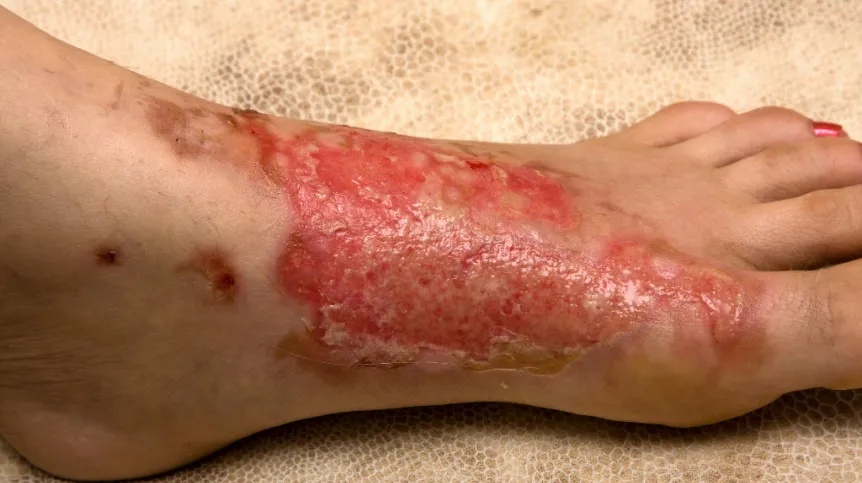
This is the first such adhesive bandage for burn, diabetic and ulcer wounds. It allows the wound to breathe, and the scars are less visible. The patent includes a biodegradable nanocellulose dressing material with particle silver, and a herb known in folk medicine - plantain. The invention has been developed by Karol Bocian, biotechnology student at the University of Technology and Life Sciences in Bydgoszcz.
"The most important material in the dressing is nanocellulose, purified plant cellulose in the form of nanoparticles. This material has a very high hydration, about 96 percent, providing the regenerating or treated tissue with access to moisture. The nanocrystalline structure of cellulose means that despite the high moisture there is a constant supply of oxygen, allowing the wound to breathe and heal faster" - the inventor told PAP.
The dressing does not stick to the wound, so there is no problem of tearing off scabs when removing it.
Karol Bocian added that in addition to beyond nanocellulose, his dressing also contains multi-functional cellulose. These are larger particles, also of plant origin, which strengthen the dressing structure and also absorb all exudates. In other words, the material absorbs secretions that accompany wound healing, for example in the case of or diabetic and ulcer wounds.
"Another advantage of this dressing is the plantain extract. It has been used in natural medicine for centuries because it promotes wound healing. The final important thing is silver in the form of nanoparticles, nanosilver, which has strong antibacterial properties. It is one hundred percent effective against Staphylococcus aureus, which is resistant to antibiotics. It is effective against most of the bacteria that cause post-surgery, hospital infections" - explained Karol Bocian.
Nanocellulose is biocompatible and hypoallergenic. It does not cause any allergies or immune reaction, it is not rejected by the body. In scientific publications there have been reports of the use of this material as a substrate for organ transplants or artificial structures of blood vessels.
Karol Bocian was one of five winners of the first prize in the national competition "Student - Inventor 2012/2013". The technology, developed in collaboration with Dr. Agnieszka Grzelakowska and Dr. Pweł Grzelakowskim under the supervision of Prof. Janusz Hermann, was submitted to the Polish Patent Office.
The researchers are waiting for the material to make a prototype dressing. The University of Technology and Life Sciences in Bydgoszcz biotechnology department carries out research and experiments aimed at obtaining nanocellulose. It is expensive and researchers must rely on free samples provided by institutes or buy the material mainly in the United States.
"Researchers are trying to optimise the process of obtaining this material. Estimates are that within two years the price per kilogram of nanocellulose will be about one dollar . Hence our interest in the material that will be cheap as water" - anticipates the inventor.
According to Bocian, nanocellulose is not currently used in medical practice, but research continues on its production and applications. For example, Łódź University of Technology conducts research on bacterial nanocellulose (it is one of the methods of its production). After purification, the product is finished material in the form of dressing - membrane or film. In Bydgoszcz powdered cellulose is used to produce hydrate gel.
"I really hope that we can market this invention, because it can help many people heal wounds. In orfer to start clinical trials, we would need to increase the scale of the project and collaborate with a pharmaceutical company. The project has not reached this stage yet, we are conducting laboratory tests" - noted Karol Bocian.
Medical dressing using nanocellulose and nanosilver is an idea that emerged during the consultations on Bocian’s engineering work. He is already planning his doctorate, however, because biotechnology is his fascination and passion, which gives hope for further discoveries.
"I have to say that this idea came up by accident, like most ideas" - the student admitted modestly.
PAP - Science and Scholarship in Poland, Karolina Olszewska
karo/ ula/ mrt/
tr. RL













